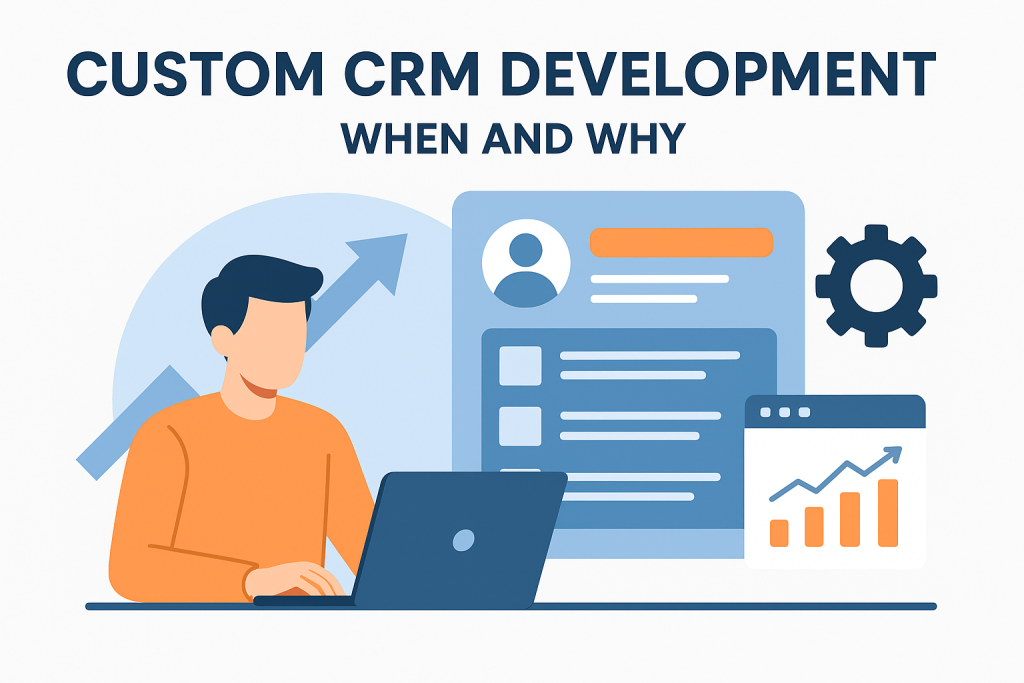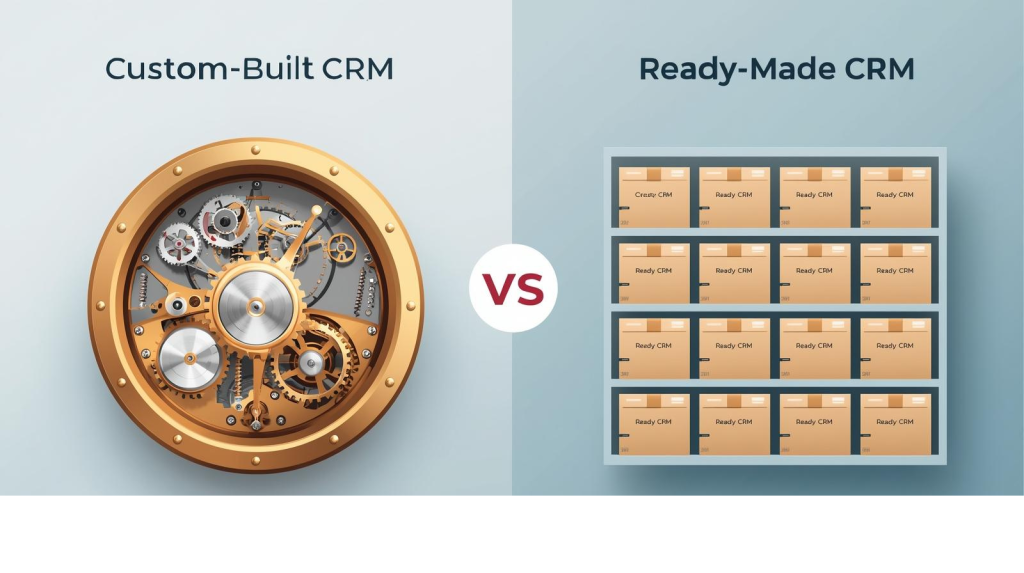Imagine a CRM system that evolves with your business, built to match your exact workflows, goals, and technology stack. Instead of adjusting your operations around generic tools, custom CRM development empowers you to create a platform that fits your organization perfectly, offering precision-built features, integrations, and top-tier data security.
As businesses increasingly move toward personalization and automation, the demand for tailored CRM systems continues to surge. Analysts estimate the CRM market will exceed $145 billion by 2029, with custom-built solutions gaining momentum as companies seek more flexibility than off-the-shelf software can offer.
This guide walks you through what custom CRM development really is, its benefits, expected costs, and how to choose the right CRM development company—whether you’re comparing partners in the USA, UK, or beyond.

What is a Custom CRM?
A custom CRM (Customer Relationship Management) system is designed from the ground up to match your unique business processes. Instead of fitting your workflows into pre-built templates, you get a system structured exactly for how your business operates.
For example:
- E-commerce brands use custom CRMs to automate loyalty programs and track segmented customer journeys.
- Educational institutions monitor student engagement with personalized dashboards and analytics.
- Service providers integrate scheduling, billing, and client management in one centralized space.
Why Invest in Custom CRM Development?
- Custom CRM solutions offer clear advantages over ready-made alternatives:
- Tailored Functionality: Each feature supports your specific workflows and objectives.
- Scalability: Add modules and integrations as your company expands.
- Data Ownership: Maintain full control of your system and customer information—no vendor lock-in.
- Long-Term ROI: Higher upfront investment but lower recurring costs compared to SaaS CRMs.
- Better Team Adoption: When tools align with real daily processes, user engagement naturally increases.

Custom vs Ready-Made CRM: Quick Comparison
| Feature | Custom CRM | Ready-Made CRM |
| Customization | Fully tailored to your workflows | Limited, often via add-ons |
| Initial Cost | Higher upfront | Lower upfront |
| Integration | Built for your tech stack | Requires plugins or middleware |
| Data Ownership | 100% yours | Typically vendor-controlled |
| User Experience | Intuitive and team-specific | Generic; requires adaptation |
Key Features of a Successful Custom CRM
An effective custom CRM should deliver flexibility, automation, and insights through features such as:
- Dynamic dashboards and customizable reporting
- Workflow automation to reduce manual effort
- Integration with accounting, marketing, and ERP tools
- Secure, role-based access controls
- Mobile-friendly access and offline usability
- Comprehensive customer profiles and activity history
The Custom CRM Development Process
- Discovery & Analysis — Understand business needs, pain points, and user roles.
- Planning & Architecture — Define system requirements, integrations, and scalability strategy.
- UI/UX Design — Create an intuitive interface for every user type.
- Development — Build modules, automation, and data structures.
- Testing & QA — Perform functional, security, and performance testing.
- Deployment & Training — Roll out the system and on board your team.
- Ongoing Optimization — Collect feedback and enhance features over time.
Structured planning and open communication between stakeholders ensure smooth delivery and prevent costly overruns.
Estimated Cost of Custom CRM Development
The custom crm development cost depends on features, integrations, and complexity:
- Basic CRM: Starting around $40,000–$60,000 (essential modules only) but actual prices may vary depending on the company, project scope, and feature requirements.
- Advanced CRM: $80,000–$120,000+ with automation, analytics, and mobile support, though costs can vary significantly based on the company demands.
- MVP (Minimum Viable Product): A cost-effective phased approach that allows gradual expansion.
Long-term costs should also factor in hosting, maintenance, and ongoing optimization.
When Off-the-Shelf Solutions Fall Short
Pre-built CRMs are great for startups or small teams, but as your business scales, you may face:
- Rigid workflows that don’t match your process.
- Costly third-party add-ons for necessary integrations.
- Limited flexibility for future growth.
That’s when custom CRM development becomes essential—allowing you to own a platform that grows with you, not against you.
Choosing the Right Custom CRM Development Partner
When selecting a CRM development company, look for:
- Proven experience building scalable CRM systems.
- Clear communication and transparent project management.
- Strong post-launch support and maintenance plans.
- Expertise in secure, flexible system architecture.
- Alignment with your long-term business goals.
Choose DevDiligent for expert custom CRM development and consulting to ensure your project’s success.
Frequently Asked Questions:
What’s the difference between development and integration?
Development creates the CRM itself, while integration connects it to tools like ERP, email, or marketing platforms.
Can niche industries benefit from custom CRMs?
Absolutely. Hotels, healthcare providers, and even logistics firms benefit from purpose-built modules tailored to their needs.
Can I start small and expand later?
Yes. Many companies begin with an MVP version and scale as requirements grow.
When and why was CRM introduced?
CRM was introduced in the late 1980s to help businesses manage customer data, improve relationships, and boost sales efficiency.
What is a custom CRM?
A custom CRM is a customer relationship management system built specifically to match your business’s unique workflows, needs, and goals.
How to develop a custom CRM?
To develop a custom CRM, define your requirements, choose the technology, build tailored features, test, and launch.
How much does custom CRM development cost?
Custom CRM development typically starts around $40,000–$60,000 for basic systems and can range from $80,000 to $120,000 or more for advanced features, but the actual cost may vary based on project scope, company, and requirements.
What is CRM development?
CRM development is the process of designing and building software that helps businesses manage customer relationships, automate workflows, and organize customer data for better communication and sales growth.
How long does it take to develop a custom CRM?
A custom CRM usually takes 3 to 6 months, depending on system complexity, integrations, and chosen features.
Can I integrate a custom CRM with my existing tools?
Yes, custom CRMs are built for seamless integration with tools like ERP, email, and marketing software and more.
What does a CRM do?
A CRM (Customer Relationship Management) system helps businesses manage and organize customer interactions by storing all customer data centrally. It enables teams in sales, marketing, and support to track leads, automate communications, analyze customer behavior, and improve relationships—leading to higher sales and greater efficiency.
What are the three types of CRM?
The three types of CRM are:
-
Operational: Automates sales, marketing, and service tasks.
-
Collaborative: Shares customer data across departments.
-
Analytical: Analyzes customer data for insights.
What is an example of CRM development?
An example of CRM development is building features like contact management, lead tracking, or marketing automation in platforms such as Salesforce, HubSpot, Zoho CRM, or Freshsales to help businesses manage customer relationships and sales.


